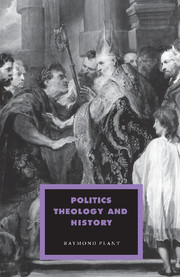Book contents
- Frontmatter
- Contents
- Preface
- 1 Liberal society and political theology
- PART I THE POSSIBILITY OF POLITICAL THEOLOGY
- 2 Theology and politics: context, community and prophecy
- 3 God, history and political theology
- 4 Totality, finitude and history
- 5 Narratives and foundations
- 6 Natural law and natural order
- PART II THE SITE OF POLITICAL THEOLOGY
- PART III LIBERALISM, RELIGION AND SOCIAL UNITY
- Select bibliography
- Index of names
- Index of subjects
- CAMBRIDGE STUDIES IN IDEOLOGY AND RELIGION
6 - Natural law and natural order
Published online by Cambridge University Press: 23 November 2009
- Frontmatter
- Contents
- Preface
- 1 Liberal society and political theology
- PART I THE POSSIBILITY OF POLITICAL THEOLOGY
- 2 Theology and politics: context, community and prophecy
- 3 God, history and political theology
- 4 Totality, finitude and history
- 5 Narratives and foundations
- 6 Natural law and natural order
- PART II THE SITE OF POLITICAL THEOLOGY
- PART III LIBERALISM, RELIGION AND SOCIAL UNITY
- Select bibliography
- Index of names
- Index of subjects
- CAMBRIDGE STUDIES IN IDEOLOGY AND RELIGION
Summary
Nature provides no standards or ideals. All that exists, exists at the same level, or is of the same logical type.
(M. MacDonald, ‘Natural Rights’)Where there is no transcendent point of reference, there is no datum for the natural order in the immanent sphere; this becomes the field of an unguided scramble for power.
(V. A. Demant, The Idea of a Natural Order)In this chapter I shall focus on the ideas of natural law and natural order as a possible foundation for Christian political theology. This is an important issue in several respects. As we saw in the second chapter, there is a plausible case to be made that at least some of the prophets of the Old Testament operated implicitly with a conception of a law of nature which applied not just to Israel as the result of its covenant with Yahweh, but to the nations generally. As we saw then, John Barton argues that:
The prophet Isaiah, working in Jerusalem in the eighth century b.c. already had a developed understanding of the basis of morality which has more affinities with western theories of natural law than has usually been thought and less in common with the notion of imperatives as ‘revealed’ or positive law given by God as the terms of a covenant or contract with the people of Israel, than is supposed by many Old Testament specialists.
This point has been taken up and developed further in the context of the claimed link between natural theology and biblical theology in James Barr's Biblical Faith and Natural Theology.
- Type
- Chapter
- Information
- Politics, Theology and History , pp. 142 - 170Publisher: Cambridge University PressPrint publication year: 2001

